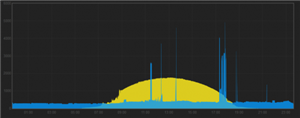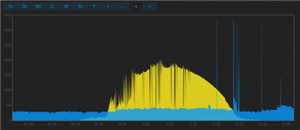On a nice clear sunny day I get a nice bell-shaped curve for PV output peaking at solar midday (my panels face almost exactly due south) with a peak output a little below their peak rating. All as expected. When it's cloudy, output is of course much reduced, again as expected. What I've noticed is that when the sun returns after a cloud passes it seems that the PV output is for a short while higher than what would have been expected had there been continuous sunshine - not for long - a matter of minutes - before it returns to normal.
My guess is that this is due to the panels getting hot in the sun - which drops their efficiency. When a cloud passes they get a chance to cool down for a but - so their efficiency goes up for a while until they've heated up again. Does that make sense?
A couple of graphs (from a few days apart this month) (PV is yellow, ignore the blue, that's just my consumption).
Firstly from a pretty clear sunny day (just a few clouds first thing in the morning) - peak is well below the 2000W line.

and then from a day with a few more broken clouds (unfortunately at a different scale - but after each cloud the output seems to be higher than the normal trend - at mid-day the spikes are much closer to the 2000W line than on a clear day) -
